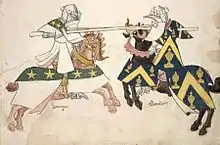Agnes Hotot
Agnes Hotot (fl. 1395) was an English noblewoman known for besting a man in a lance fight. According to Arthur Collins, writing in 1741, an unspecified monk recorded that Hotot took her father's place in a duel after he fell ill, disguising herself as a man, and only revealed her true identity after knocking her opponent off his horse. When Hotot later married into the Dudley family of Clapton, Northamptonshire (now Clopton), the Dudleys commemorated her exploits with a new crest depicting a woman wearing a war helmet.
Agnes Hotot | |
|---|---|
| Nationality | English |
| Years active | fl. 1395 |
| Known for | Winning a lance fight |
More modern accounts of Agnes Hotot's story have altered and combined it with the Clopton ghost story of "Skulking Dudley", painting Agnes as the virtuous daughter of an immoral man from the Dudley family. In this version, Agnes takes her father's place in the duel after he cowardly feigns illness. She ends up marrying her opponent.
Biography
Agnes Hotot was a young heiress of the family of Hotot.[1][2] Her father was Sir John Hotot.[3]
Hotot's father was involved in a dispute with a man named Ringsley, and in order to settle it, they arranged to have a lance fight. Shortly before the duel, however, Hotot's father fell ill with gout, so "rather than he should lose the land, or suffer in his honor", Hotot disguised herself in her father's armour and fought in his place at the tourney. She knocked Ringsley off his horse.[1][4][5] As her opponent lay in the dirt, Hotot took off her helmet and let down her hair to reveal her true identity.[6][7] Some accounts state that she also removed her breastplate to expose herself as a woman.[7][8]
In 1395, Hotot married into the Northamptonshire Dudleys of Clapton[9] (now Clopton[1][3]). The Dudley family created a new crest in commemoration of Hotot's lance victory, which included "a woman's bust, her hair disheveled, bosom bare, a helmet on her head, with the stay or throat-latch down", and the Dudley family displayed this crest for many years afterwards.[1][2][7][10] Hotot's story was recorded by a monk in the village of Clapton.[5][10]
More modern accounts of Hotot have combined her story with the legend of "Skulking Dudley": a man from the Dudley family who, after supposedly committing murder in the 1300s, returned to haunt Clopton villagers in the early 20th century. In this modern version, Agnes is the daughter of Skulking Dudley; her father offends a nearby landowner, then cowardly feigns illness to escape the duel, and Agnes takes his place to save the family honour. Although she loses the fight, her opponent discovers her identity, spares her life, and marries her.[3]
References
- Grazebrook, Henry Sydney (1873). The heraldry of Worcestershire. John Russell Smith. pp. 176–177.
- Millington, Ellen J. (1858). Heraldry in History, Poetry, and Romance. Chapman and Hall. pp. 296.
- Westwood, Jennifer (31 October 2013). Haunted England: The Penguin Book of Ghosts. Penguin UK. ISBN 9780141959535.
- Collins, Arthur (1741). The English Baronetage, Containing a Genealogical and Historical Account of All the English Baronets Now Existing. Printed for Thomas Wotton, London.
- Dobson, Susanna Dawson (1795). Historical anecdotes of heraldry and chivalry: tending to shew the origin of many English and foreign coats of arms, circumstances and customs. Printed by Hall and Brandish. pp. 229.
- Kasparek, Rick (5 December 2014). Knight of the Grail Code. WestBow Press. p. 122. ISBN 9781490862002.
- Salmonson, Jessica Amanda (7 April 2015). The Encyclopedia of Amazons: Women Warriors from Antiquity to the Modern Era. Open Road Media. ISBN 9781453293645.
- Frankel, Valerie Estelle (11 April 2014). Women in Game of Thrones: Power, Conformity and Resistance. McFarland. pp. 44–45. ISBN 9781476615547.
- Dudley, Dean (1848). The Dudley Genealogies and Family Records. The author. pp. 15.
- Burke, J. Bernard (29 March 2017). The Heraldic Register. Lulu.com. p. 17. ISBN 9780995724655.
